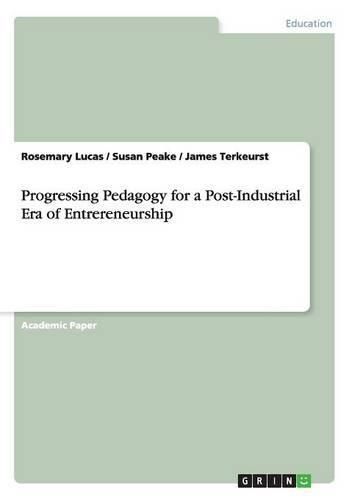Readings Newsletter
Become a Readings Member to make your shopping experience even easier.
Sign in or sign up for free!
You’re not far away from qualifying for FREE standard shipping within Australia
You’ve qualified for FREE standard shipping within Australia
The cart is loading…






Academic Paper from the year 2012 in the subject Pedagogy - Higher Education, grade: Post Doctoral, University of Teesside (Teesside University Business School), course: NA, language: English, abstract: This paper looks to ‘The Institute of Digital Innovation’ (IDI), based in the North East of England. Being a recently conceived establishment the IDI has developed a forward-thinking pedagogy that supports and equips budding entrepreneurs with the necessary skills for commercial success, and is thus in keeping with current policy rhetoric that future economic growth will depend on private enterprise. But perhaps more importantly, these authors argue, the IDI embodies a broader vision than the health of the economy alone; it both reflects and projects a changing culture in which the signature of success lies less in ‘quantity’ (wealth and conspicuous consumption) but in ‘quality’, which Inglehart defines as belonging, self-expression, and the quality of life (1990, p.11). Drawing on qualitative primary data provided by both IDI staff and Fellows, we conclude that a more culturally relevant approach to education is called for: Innovative and progressive pedagogical thinking will provide an educational model better equipped to accommodate both a sustainable economy, and the cultural shifts that are reshaping the desires and preferences of younger generations. The previous decade has seen a mushrooming of academic commentary on the pedagogic underpinnings of entrepreneurship education within universities and colleges, a prevailing theme being the embeddedness of organisational and teaching practices that are hopelessly out of date, and which do little to equip students with the skills they will need to operate in a commercial environment which demands creativity, innovation, flexibility and entrepreneurial competencies.
$9.00 standard shipping within Australia
FREE standard shipping within Australia for orders over $100.00
Express & International shipping calculated at checkout
Academic Paper from the year 2012 in the subject Pedagogy - Higher Education, grade: Post Doctoral, University of Teesside (Teesside University Business School), course: NA, language: English, abstract: This paper looks to ‘The Institute of Digital Innovation’ (IDI), based in the North East of England. Being a recently conceived establishment the IDI has developed a forward-thinking pedagogy that supports and equips budding entrepreneurs with the necessary skills for commercial success, and is thus in keeping with current policy rhetoric that future economic growth will depend on private enterprise. But perhaps more importantly, these authors argue, the IDI embodies a broader vision than the health of the economy alone; it both reflects and projects a changing culture in which the signature of success lies less in ‘quantity’ (wealth and conspicuous consumption) but in ‘quality’, which Inglehart defines as belonging, self-expression, and the quality of life (1990, p.11). Drawing on qualitative primary data provided by both IDI staff and Fellows, we conclude that a more culturally relevant approach to education is called for: Innovative and progressive pedagogical thinking will provide an educational model better equipped to accommodate both a sustainable economy, and the cultural shifts that are reshaping the desires and preferences of younger generations. The previous decade has seen a mushrooming of academic commentary on the pedagogic underpinnings of entrepreneurship education within universities and colleges, a prevailing theme being the embeddedness of organisational and teaching practices that are hopelessly out of date, and which do little to equip students with the skills they will need to operate in a commercial environment which demands creativity, innovation, flexibility and entrepreneurial competencies.